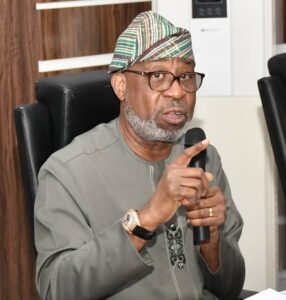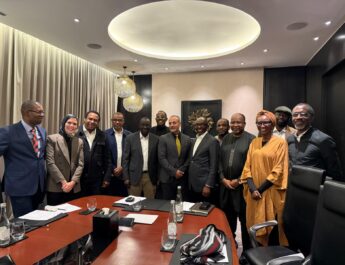It seems each time Nigeria looks to being blessed with one mineral resource or the other, it comes with a ‘curse.’ As the nation continues to grapple with the challenge of environmental degradation caused by decades of crude oil exploration in the Niger Delta, another mineral curse rears its head with several collapses of illegal mining sites across the country, killing scores of young persons. This is exacerbated by the complicity of Northern elites who have been accused of engaging in illegal mining of solid minerals, particularly Gold and Lithium in parts of the country, but civil society groups say only a regulated, responsible and accountable mining of the country’s abundant mineral resources will salvage the situation and steer the country on the path of prosperity
By Edu Abade
The Beginning
In what looks like an advanced replay of what has been happening in Nigeria’s oil and gas sector in which powerful and influential figures in the North hijacked over 80 percent of the nation’s oil blocs for over six decades, illegal mining has taken an unprecedented dimension, leaving the country to bleed from sheer plunder of its solid mineral resources.
From Alagbaa to Ojoo in Akinyele Local Government of Oyo State to Ondo, Kogi, Osun, Ekiti, Zamfara and states endowed with diverse solid minerals, illegal mining of Gold, Gemstones, Bitumen, Iron Ore, Tantalite, Columbite, Cassiterite, Columbite, Bismuth, Red Clay, Kaolin and Talc, among others, has been rife in the country.
To maximize the gains of the abundant solid mineral resources demystify the conspiracy at the national level, Oyo State Governor, ‘Seyi Makinde, only recently stepped in to ensure proper and responsible mining of the essential mineral resources in his domain through legislation. Investigations reveal that agents of the state government have effectively taken over most of the mining sites from illegal miners, especially in Alagbaa and Ojoo.
Be that as it may, illegal mining activities have continued unchecked across the country. From Zamfara, with proven commercial quantity of Gold, as well as Nasarawa, Kogi, Kwara, Edo and Cross River states with enviable quantity of Lithium (which has been described as ‘transition mineral’ due to its value in the making of electric vehicle batteries, solar panels and cell phone batteries, among others), unregulated and illegal mining has been the order of the day.
The case of Zamfara Gold has been most pathetic in that even as banditry and terrorism hold say in the North East, illegal mining of Gold by foreign firms parading as legitimate companies purportedly recognized by the Federal Government and often with the aid of local collaborators, cart way large quantities of Gold with aircraft to international market where they earn millions of dollars. The situation is nothing by dire!
It has been argued elsewhere that if the Federal Government put adequate measures in place to harness the abundant solid mineral resources in most states of the country, Nigeria stands the chance of earning twice as much from solid minerals that from oil and gas. But that has not been the case.
But by and large, negligence and seeming helplessness on the part of the government had left the sector largely populated by illegal miners, mostly foreigners, who are being assisted by their local collaborators.
Tragedy Of Illegal Mining
Unregulated mining of solid minerals in Nigeria has assumed a crisis of unthinkable dimension. In 2024 alone, hundreds of young people lost their lives to collapse of mining pits in Shiroro, Niger State; Karu and Awe councils of Nasarawa State; Bassa in Jos South and Jos North councils of Plateau State; Ojoo in Oyo State, as well as Gashaka Local Government Area in Taraba State, Toungo Local Government Area of Adamawa State and other parts of the country.
As it is common with Nigeria, there is the possibility that other incidents of mining sites collapse may not have been reported and documented. Although the development has led the Federal Government to establish what it called Mining Marshalls in the country, their impact have not be felt as of now due to complicity of power individuals like traditional rulers of mining communities and lately the purported involvement of retired military officers.
It would be recalled that Minister of Interior, Olubunmi Tunji-Ojo, unveiled the Mining Marshals to checkmate illegal mining of solid minerals across the country, but that in spite of that, mining by unauthorized persons and companies continue to thrive in most parts of the country, further confirming the alleged involvement of powerful interests in the menace.
A New Twist Emerges
Reacting to the menace of illegal mining in the country, a former Governor of Edo State and now Representative of Edo North Senatorial District in the National Assembly, Comrade Adams Oshiomhole accused the Federal Government of double standards in its handling of economic sabotage in the Niger Delta and the North.
Oshiomhole, said while the Federal Government has been hitting very hard at Illegal oil bunkers in the Niger Delta, it turns a blind eye and treats illegal miners in the North with kid gloves, insisting that government’s effort to diversify the economy would not amount to anything if the FG does not take seriously the embarrassing illegal mining going on in the country, particularly in the North.
He urged the President Bola Ahmed Tinubu administration to stand up to the illegal miners with a sledge hammer as it does to illegal oil bunkering in the Niger Delta, saying the Federal Government knows the big men behind the illegal mining business, but does nothing.
Oshiomhole also revealed that he wrote a letter to former President Muhammadu Buhari, showing evidence of his claims and challenged him to arrest the big men, but that his plea was ignored.
Oshiomhole further indicted retired army generals as being behind the unwholesome business as well as behind banditry and kidnappings in the country, adding: Perhaps it is the fear of the generals that stops the Federal Government from dealing decisively with the illegal miners.
His words: “Whereas the Federal Government is ruthless with people who are doing illegal oil bunkering by deploying the Joint Military Task Force to deal with them, when it comes to illegal mining of solid minerals, the Federal Government changes.
“It’s like using different standards and I am very angry about that. If we have to fight this menace, we need to deploy the Army even to kill anyone who is involved in the illegal pumping of oil. We should also deploy JTFs, comprising the Army, Police, Air Force, against them.
“The ongoing illegal mining across the country are being carried out by retired generals and we know them. There is nobody in Africa who doesn’t know them. I did a letter to former President Muhammadu Buhari on the matter when he was in office. This is because a team that I sent to go and conduct the primary somewhere reported that conducting primary elections in Zamfara was a big challenge because of illegal miners.
“The team told me that those illegal miners procure arms exactly the same way the military is doing in South Sudan. They give them arms. They use choppers to come and cart away the gold and they take them out of this country and make billions of U.S. dollars.
“These guys have been weaponized by the big men who deploy a secure territory. The weaponry was made to protect the Chinese and other foreigners and that’s why they are actually engaging in indiscriminate mining. So, retired military officers and army officers are involved in it. If we can’t tell the truth, this country cannot flourish. That is what is going on with the mining sub-sector.”
Army Responds
As Nigerians await the reaction of the Federal Government and the Military High Command to Oshiomhole’s serious submission, a retired Army Brigadier General and former Commander, 1 Division, Nigerian Army, John Sura, dismissed Oshiomhole’s accusation as bunkum. Speaking in an interview, he said: “It is the highest level of falsehood that anybody can ever peddle.” Even with Sura’s denial of the claims, the Federal Government and the Ministry of Solid Minerals Development, headed by Dele Alake, seem helpless, as no concrete steps have been taken to address the menace.
Civil Society Groups Raise Concern
Worried by the poor monitoring and non-regulation of activities in the solid minerals sector, some civil society groups have proposed amending the National Oil Spill Detection and Response Agency (NOSDRA) Act to include monitoring of solid minerals extraction and mining activities in the country.
Established in 2006, NOSDRA is responsible for monitoring and responding to oil spills in Nigeria and acts as the intermediary between oil companies and communities at the local and state levels.
Representatives of the Environmental Defenders Network (EDEN) and Citizens Free Service Forum (CFSF) made the recommendation at a meeting with the Chairman, House of Representatives Committee on Solid Minerals Development, Hon. Jonathan Gaza Gbefwi, at the National Assembly Complex in Abuja.
The groups met the lawmaker to demand urgent intervention in addressing the impacts of solid mineral extraction in parts of the country, where illegal mining has led to degradation of the environment and sexual exploitation of young girls.
They expressed concern that the seeming intractable challenge of illegal mining in the country was traceable to the lack of a coordinating agency charged with proper monitoring of the activities of players in the sector. Hence, illegal miners mistreated host communities and disdained the environment.

They maintained that the proposal for an agency that would monitor and respond to infractions in the oil and gas and solid minerals sectors will also be in line with the current administration’s vision of pruning ministries and agencies and driving down the cost of governance as recommended in the Orasanye Report.
Deputy Executive Director of EDEN, Comrade Alagoa Morris, explained that the proposal for amendment of the NOSDRA Act to incorporate solid minerals sector monitoring will not only address illegal mining but will also empower local communities to hold the despoilers of their environment to account.
Alagoa, who insisted that community people where solid minerals are mined currently do not know who to report to or which government agency can fight for them when there are infractions, added that mining communities should learn from the lessons of the Niger Delta, where 60 years of extraction have only brought pain, deaths, and destruction.
Echoing the need for urgent action to address the illegal mining menace in the North, Deputy Executive Director of CFSF, Comrade Bomoi Mohammed Ibraheem, insisted that the amendment of the Act would resemble the subsuming of the Niger Delta Development Commission (NDDC) under the Ministry of Niger Delta Affairs.
Earlier, Gbefwi explained that he would ensure that the cases brought before his office by the three organisations are adequately investigated and sanctions proposed if violations of the environment and the rights of the people are established.
The lawmaker also disclosed that the House of Representatives will reach out to other relevant departments of government to identify the illegal mining companies as well as those that are not adhering to statutory environmental standards in their operations.
“We have learnt about the deaths of children in one of the communities where mining waste polluted the river. We will investigate and ensure the violators are brought to book. Such incidents will not be swept under the carpet,” he stressed.
Also, the Citizens Free Service Forum (CFSF) lampooned the Ministry of Solid Minerals over the spate of illegal mining activities that have led to several deaths in the country, cautioning that if the ministry fails to initiate a proactive approach to stop the incidents, local communities may start resisting illegal mining operations.
In a statement issued in Abuja, the CFSF said that it has become worrisome that despite the publicity around the Federal Government’s introduction of Mining Marshals, only a few arrests have been made in connection with illegal mining, yet new sites of illegality continue to spring up.
Executive Director of CFSF, Comrade Sani Baba said: “The mine collapse incidents in the north have assumed frightening proportions that match the widespread illegal mining of precious minerals in formerly peaceful communities. The failure of the government to nip the crisis in the bud is worrisome because the situation is getting out of hand.”
Baba said that the number of Chinese nationals that have been arrested in Nasarawa and other states of the North over illegal mining indicates the seriousness of the problem, adding that foreign nationals are swarming the country in search of solid minerals and give no hoot about the state of the environment or lives lost in their insatiable appetite for solid minerals.
“If the Mining Marshals initiative is as proactive as the media hype that greeted its launch, we would not be having the spate of mining-related deaths in the country. In the space of three months there have been more than three illegal mines caving in and killing the productive generation of this country. It is simply untenable.”
The CFSF helmsman suggested a review of the operations of the Mining Marshals and recommended that they work in synergy with local communities that are conversant with happenings in their community and can identify those perpetrating illegalities and those working with them.
“It is now time for the Ministry of Solid Minerals to go beyond talk and get to real work. The real work is being able to fish out the masterminds of the illegal mines and stopping the deaths of young children forced into mining due to the poverty in their communities. If this is not done the communities will start revolting because their right to life and sustainable environment are being violated,” Baba stressed.
On its part, the Corporate Accountability and Public Participation Africa (CAPPA) enjoined the Federal and state governments to enforce strict monitoring and regulatory measures against illegal mining activities to prevent further tragedies across the country.
The group said this in response to the recent collapse of an illegal mining site in Adamawa State on November 6, 2024, which killed no fewer than 30 gold miners in the buffer zone of the Gashaka-Gumti National Park.
The organisation expressed deep concern over the incidences of illegal mine camps and even mines collapse across the country, stating that these challenges now cast doubt on the operational effectiveness of the Mines Surveillance Task Team, as well as other monitoring outfits designed to regulate such occurrences.
Executive Director of CAPPA, Akinbode Oluwafemi, said: “Despite existing regulations, illegal mining continues to proliferate, revealing serious gaps in enforcement, often at the expense of local communities.
“Our field investigations have uncovered illegal and abandoned mining camps operated by local and foreign—often Chinese-interests in Nasarawa, Osun and Ekiti, among others. Artisanal miners, primarily impoverished locals and vulnerable groups such as women and children, risk their lives digging as deep as 200 feet with nothing but shovels and minimal safety measures and equipment.
“This unregulated extraction not only facilitates the plunder of communal resources but also leads to severe environmental degradation, leaving behind hazardous open pits that endanger not only the miners but the broader community alike.”
The group of environmental activists expressed concern over the pressing need to address the socio-economic conditions that compel locals into unsafe mining practices, reflecting that poverty, created and sustained by systemic exclusion, forces many to engage in dangerous mining operations as a means of survival.
It further cautioned that as global capital now drives the scramble for minerals, especially by China, United States of America, Germany and other advanced countries to support a “green transition,” mineral-rich communities in Nigeria will remain locked in cycles of exploitation and danger unless they are allowed a rightful stake in the wealth extracted from their lands.
Solution
Environmentalists caution that without structural changes that redistribute economic empowerment, illegal mining will continue as an imposed, desperate option for the poor and vulnerable. While we continue to sound the alarm about the dangers of illegal mining, Nigerians and the authorities must also address the conditions that push individuals into high-risk activities.
It should also be noted that although the Artisanal and Small-Scale Mining Department (ASSMD) under the Ministry of Mines and Steel Development has the mandate of helping small-scale and artisanal miners to formalise their operations and access support, the costs of obtaining a mining lease and other official requirements make the process difficult for many.
“For instance, recent revisions to the fees for obtaining a Small-Scale Mining Lease as announced by the Ministry of Solid Minerals Development in July, now stands at N300,000 for two Cadastre units as opposed to an initial N10,000.
“While this fee might seem modest for mining cooperatives and corporate interests, it is unrealisable for many impoverished individuals and communities who rely on artisanal mining for survival. In practice, this barrier allows big players and corporate profiteers to secure this lease and proceed to exploit the labour of artisanal miners, who work under harsh and unsafe conditions and reap profits for them,” they stressed.
They, therefore, urged the Federal Government to review and reform mining policies to make licensing processes accessible and affordable for local communities and small-scale miners, while seeking a reduction in licensing fees, simplifying application processes and providing technical and educational support to equip small-scale miners with safer, legal pathways.




